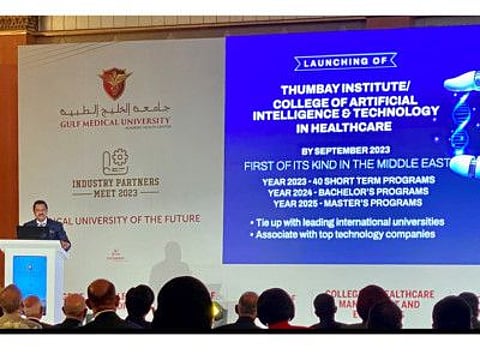UAE to get first college for AI in healthcare: How it will help
It’s all about empowerment of healthcare professionals to provide better care

Dubai: The UAE is set to get its first higher educational institute for Artificial Intelligence (AI) in healthcare soon.
Ajman-based Thumbay Group’s Gulf Medical University has announced the Thumbay Institute/College of Artificial Intelligence and Technology in Healthcare which is scheduled to begin operations in September this year.
Speaking to Gulf News on the sidelines of an industry event to announce the details of the project in Dubai, Dr Thumbay Moideen, founder president, Thumbay Group, said the facility will commence as “an institute offering short-term certificate courses in September this year and will be upgraded to a college in 2024.”
“We have tied up with some good universities and we are tying up with major tech companies. We are looking for more collaborators and industry partners for this project. We hope to have 400 students and our own building and labs in the next three-four years,” said Dr Moideen.
He also explained how AI will revolutionise healthcare in the years to come. From streamlining administrative tasks to improving diagnostic accuracy, AI is empowering healthcare professionals to provide more efficient and effective care, he pointed out.
Dr Moideen enlisted five ways the application of the revolutionary AI tools can provide new capabilities that will enhance workflow outcomes in the healthcare industry.
Education and training
The way healthcare professionals are educated and trained is changing as a result of the use of AI applications. “AI algorithms are used to power Virtual Reality (VR) and Augmented Reality (AR) technology to build lifelike simulations for medical education.”
With realistic simulations, he said, a safe and immersive environment for healthcare professionals to practice surgical procedures, medical interventions, and emergency scenarios can be provided.
Healthcare practitioners can improve their skills and knowledge by using AI-driven training platforms that can also assess student performance and offer individualised feedback.
This, he said, can help guarantee that the healthcare workforce is well-prepared, confident, and up-to-date with the latest developments in the industry.
Efficient administration
Managing time-consuming administrative tasks with AI is going to be a big blessing for healthcare professionals.
“They will get plenty of time to focus more on patient care by automating repetitive and time-consuming admin jobs,” said Dr Moideen.
AI tools can analyse and extract relevant information from medical documents, reducing the burden of manual data entry and improving accuracy. AI-powered systems can also streamline appointment scheduling, billing, insurance claims, and assist with inventory management, leading to improved operational efficiency within healthcare organisations.
Early intervention
The use of AI in analysing large data is set to change how the healthcare industry will predict diseases and provide early intervention.
“To find trends and forecast disease outcomes, vast datasets, such as patient records, genetic data, and environmental factors can be analysed using AI. Healthcare professionals can proactively identify people who are at high risk of contracting certain ailments and put preventive measures in place by using predictive analytics. Early illness management based on AI-driven insights has the potential to reduce the risk of serious health consequences.”
Medical imaging and diagnostics
Dr Moideen highlighted that deep learning algorithms are also assisting radiologists in interpreting complex scans and detecting diseases like cancer at early stages with higher accuracy.
“With deep learning algorithms, healthcare professionals can analyse vast amounts of imaging data. This will help detect diseases such as cancer at early stages with higher accuracy. AI-powered diagnostic tools can significantly reduce the time required for diagnosis, enabling prompt treatment and improved patient outcomes.”
Virtual assistants for engagement
Virtual assistants and chatbots have already started transforming the way patients interact with healthcare providers in different parts of the world.
“These tools are used to offer individualised healthcare information, help schedule appointments, respond to simple medical queries, and even remotely monitor patient symptoms.”
By leveraging AI-powered virtual assistants, Dr Moideen said, healthcare institutes can improve patient engagement, streamline administrative processes, and ensure round-the-clock access to healthcare support.
“The incorporation of AI into day-to-day workflow has several benefits. Healthcare professionals can focus on more innovative and strategic work by automating repetitive tasks. AI should be able to provide doctors, nurses, and faculty with deeper insights since it can analyse a lot of data. However, humans will still be needed in future workplaces, especially in healthcare, as excessive reliance on AI without human oversight or critical thinking could be harmful,” Dr Moideen said.
During the event, he also announced the launch of Thumbay Healthcare Incubator Centre which will support start-ups, entrepreneurs and innovators, providing them with mentorship, resources, and an enabling ecosystem to transform their ideas into impactful solutions. “I am talking to the government to see if we can get a free zone status for this project,” Dr Moideen added.
The event created a platform for collaboration between academia and the business world by bringing together prominent industry leaders, executives, and professionals from diverse sectors.



